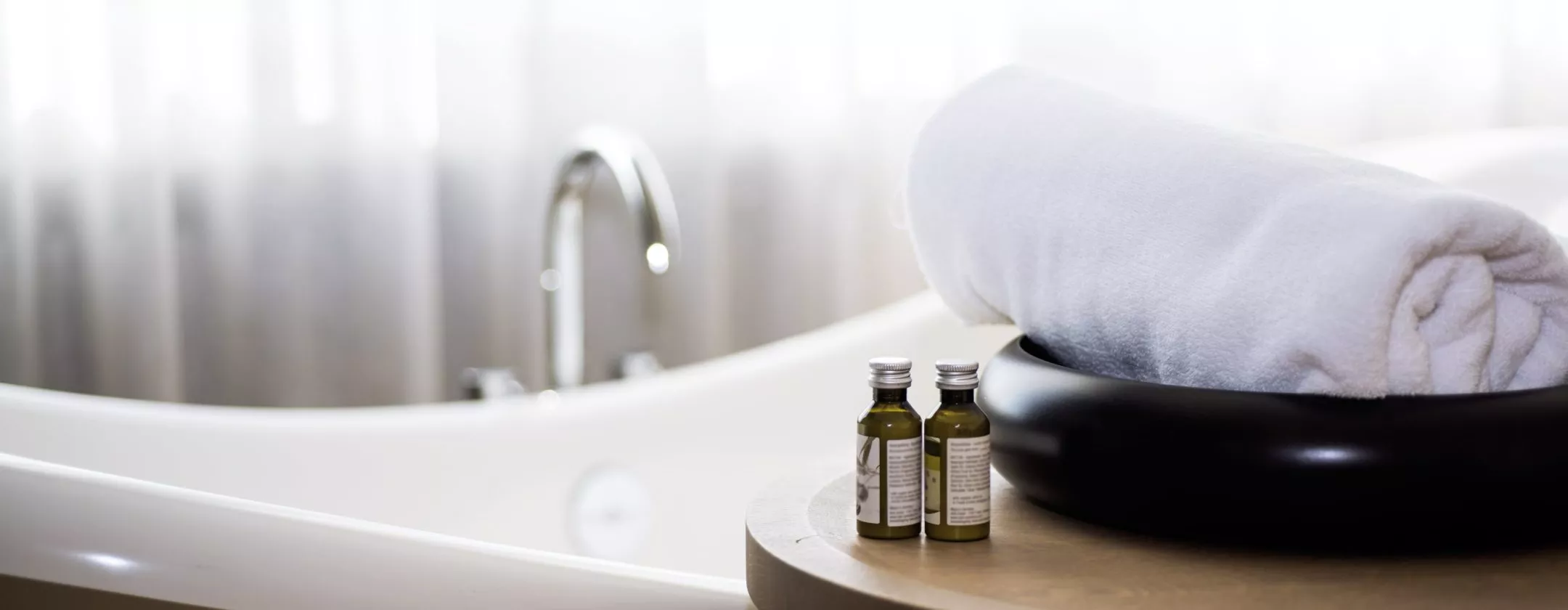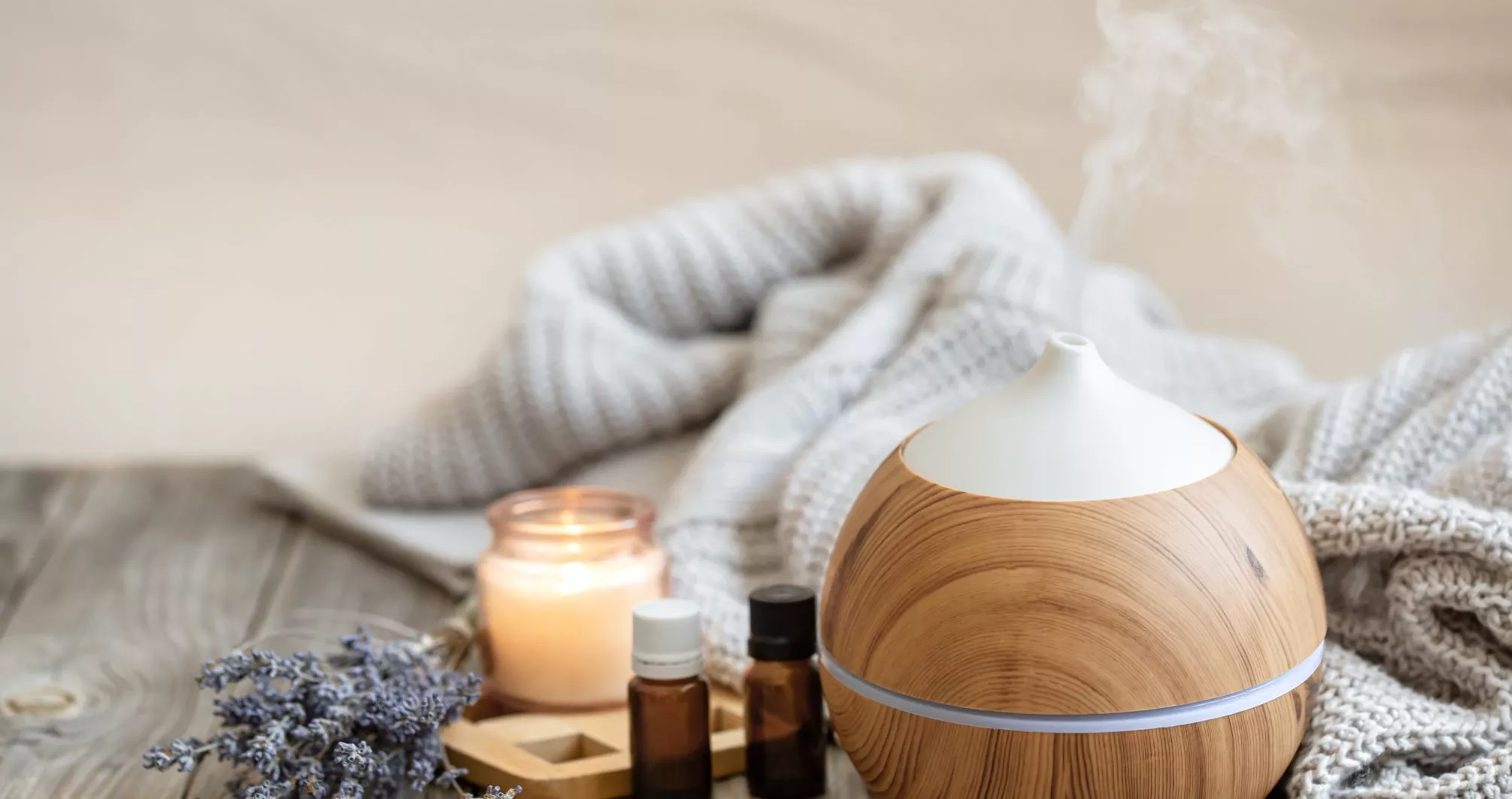Have you ever inhaled a fragrance and been immediately transported to the past? The smell of freshly baked cookies may have transported you to a time in childhood when you baked with your mother. The musty scent of an old book may make you remember your college study sessions reading voraciously in the library. Scents are detected through our olfactory system, stimulating receptors linked to the part of the brain that regulates emotions.
It’s no wonder then that for centuries people have been using aromatherapy as a beneficial means of relaxing, energizing, or easing muscle pain. Less widely known, however, are the many benefits aromatherapy can have for loved ones with dementia. While seniors with dementia have a diminished sense of smell, a strong aroma can stimulate memories, as some of our strongest memories are triggered by our sense of smell. Not only can a strong aroma boost memory, but it can also provide stress relief, ease muscle aches, and improve mood.
What is aromatherapy for seniors with dementia?
Aromatherapy is a natural, holistic way to ease symptoms of dementia using concentrated essential oils from flower, plant, and herb extracts. Loved ones with dementia often feel restless, anxious, or agitated. Aromatherapy can be an effective way of easing these behaviors that impede quality of life. While aromatherapy cannot cure Alzheimer’s or dementia and is no substitute for appropriate medication, it can help enhance the physical and emotional well-being of people living with dementia.

Photo Courtesy of FreedomMaster/iStock
What are the benefits of aromatherapy for dementia symptoms?
There can be many benefits of aromatherapy for loved ones with dementia:
1. Aromatherapy can increase cognitive function.
The decline of cognitive function is quite distressing to individuals and their families. While essential oils are not interventions for reversing dementia, a 2013 study states that people with dementia still have the ability to learn and retain skills and information. To help stimulate your loved one’s brain, try using certain essential oils like lemon and rosemary–proven to “activate the sympathetic nervous system, improving concentration and memory” according to a 2020 study. A 2012 study reaffirms the validity of that study, finding that rosemary can “influence cognitive performance and mood” and that, through the olfactory organ, rosemary oil stimulates locomotor activity. Try rosemary and lemon to give your loved one’s brain a boost.
2. Applying or inhaling essential oils can help with mood changes and decrease depression and anxiety.
Depression is a widespread problem–a study from the BrightFocus Foundation found that one in six people with dementia suffers from major depressive disorder. People with dementia and depression can become apathetic, incapacitated, withdrawn, sad, aggressive, and even suicidal. Aromatherapy can reduce depression, as essential oils stimulate olfactory receptors connected to the hypothalamus, the region of our brain that controls hormones and affects sleep and emotional regulation. Stimulating the hypothalamus releases neurotransmitters like serotonin, the mood-stabilizing hormone that creates feelings of happiness. Along with medication, care from loved ones, and therapy, aromatherapy can be a great supplement for easing depression.
3. Aromatherapy can help people with dementia sleep better.
Sleep problems are common for people with dementia due to increased agitation, anxiety, and late-day disorientation called sundowning. The lack of restful sleep not only exacerbates agitation, but it also causes people with dementia to feel constantly fatigued and unenergetic, unable to function in the daytime. According to the Sleep Health Foundation, common effects of not getting good sleep are tension, sleepiness, lack of focus, increased risk of falls, and depression. In addition to good sleep habits such as a regular bed time and staying active and napping during the day before lunchtime, try an uplifting scent like grapefruit, orange, and lemon essential oil to invigorate your loved one’s senses during the day when they want to stay awake.
4. Aromatherapy can help ease anxiety.
People with dementia can become easily anxious due to the deterioration in the part of the brain that regulates emotions, confusion from loss of memory, boredom, and fear and fatigue from trying to make sense of overwhelming stimuli. There are many different ways to quell their anxiety, but soothing scents is one more way to help. A study published in 2007 found that rosemary and lavender reduce cortisol, the body’s response to stress. Help prevent stress in your loved one with some calming scents.
5. Aromatherapy can also stimulate appetite.
People living with dementia often have reduced appetite, causing unhealthy weight loss. Many caregivers turn to appetite stimulant drugs, but a study from Barbra Bauer of Sharp Coronado Hospital found that using scents caused “early patients to improve to the point where they no longer need appetite stimulants and their sleep medications are decreased.” Appetite-stimulating scents most commonly recommended are citrus, peppermint, and spearmint.
6. Aromatherapy can help ease muscle aches and stiff joints.
Muscle atrophy and weakness may result from a person’s decline in exercise and brain function and normal aging, which reduces the ability to lead a full, vibrant life. A study published in 2016 attempting to quantify aromatherapy’s effectiveness in pain management found “a significant positive effect of aromatherapy in reducing pain.” You can ease a loved one’s tired muscles by massaging it into the skin, adding a few drops to a hot bath, or creating a cold compress dipped in water and essential oils.
7. Aromatherapy can stimulate memories.
Aromatherapy can stimulate memories, since implicit memories, the last ones to leave, are often connected to our sense of smell. Essential oils stimulate the hippocampus, the part of your brain that governs memory. A study from Northumbria University found that rosemary essential oil may enhance the ability to remember events and complete tasks at certain times. However, smells may trigger distressing memories, so it is paramount that aromatherapy should be used slowly in small amounts so you can see if it has a positive effect on your loved one.

Photo Courtesy of fizkes/iStock
Is aromatherapy safe for seniors with dementia?
While essential oils are all-natural and are often used because of their limited side effects, they need to be used with caution. Seniors with dementia often have an impaired sense of smell, so it should only be used if it brings calm and joy to your loved one. It should also not be seen as a replacement to medical care, but as a complement. Be sure your loved one’s skin is not irritated, they do not suffer any allergic reactions, and the essential oils are not ingested. Do not use pure essential oils directly on the skin. If your loved one is sensitive to smell, they may get a headache which they may not be able to communicate. It should largely be seen as one tool of many to help your loved one relax.
How can I use aromatherapy?
- Try applying essential oils on a cotton ball for your loved one to smell.
- Infuse essential oils into the air through a diffuser or steamer or sprays.
- Add a few drops of essential oils to your cold or hot compress to relax tired joints and muscles
- Mix a few drops of essential oils with other carrier oils like grapeseed oil, jojoba oil or olive oil and massage onto the body and hands.
- You may also wish to add a few drops to your loved one’s hot bath.
What are the top ten essential oils beneficial for those with dementia?
Here are some essential oils with unique properties that you may wish to use::
For relaxation
- Lavender: Use to relax and sleep better. Use a carrier oil and apply to burns, scrapes, and other injuries to soothe pain and speed healing.
- Eucalyptus: Opens airways. Cleans and freshens air and disinfects surfaces.
- Tea tree: Soothes earaches and irritated skin. Use with a carrier oil to clean and disinfect.
- Frankincense: Boosts immune system and relieves pain. Reduces the appearance of scars.
- Rose: Eases pain, decreases anxiety, and benefits emotional balance and skin health.
For energizing and uplifting
- Peppermint: Use to relieve nausea and head tension. Cools the body and boosts energy.
- Rosemary: Relieves muscle and joint pains, boosts immune system, reduces acne, fights signs of aging, grows hair.
- Wild Orange: Soothe frazzled nerves and upset stomachs. Used for its antibacterial properties.
- Lemongrass: Joint support, insect repellent, improve eyesight, clear infections
- Cinnamon: Provides pain relief. Helps with arthritis, depression, and diabetes. Boosts the immune system.

Photo Courtesy of puhimec/iStock
Here at Oakmont, we love to incorporate aromatherapy in our events as both a relaxing and health and wellness activity.
- We created our Traditions Spa Towel Program–designed to assist memory care residents in hand and face washing before meals. Residents receive hot wash cloths with a few drops of essential oils for washing. The purpose of the Spa Towel Program is to not only improve hand hygiene and reduce the spread of germs, but to give residents a pleasant sensory experience before each meal, stimulating the senses of smell and touch.
- In our chair yoga and meditation classes, we also incorporate diffusers to relax the senses. It’s also a way for memory care residents to learn about the uses and benefits of different essential oils.
- We also have themed sensory experience events in which we engage residents’ sense of smell, touch, sight, and sound through our use of props, fans, sensory touch items, and essential oil diffusers. Your loved one can experience many outdoor natural wonders since past themes have been Amazon Jungle, Camping under the Stars, Desert Oasis, Flower Fields, Ocean Adventure, Safari, and Waterfalls.
- At VIP events and in independent living/assisted living communities, we also enjoy creating essential oil rollers with residents.
We consider compassion and finding the best methods of care for residents with dementia our highest priority. We’d love for you to join our serene community where you’ll find daily rejuvenating treatments and revitalizing activities geared to ease symptoms of dementia. Contact us today for a tour.



